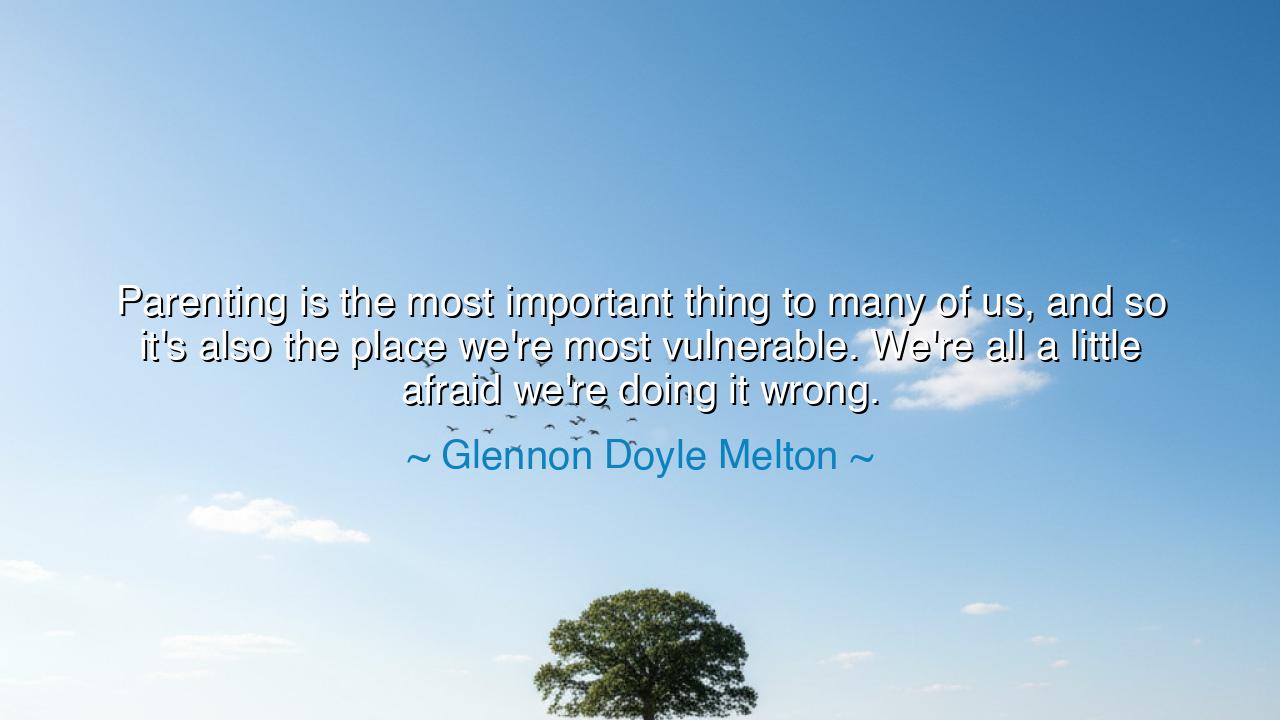
Parenting is the most important thing to many of us, and so it's
Parenting is the most important thing to many of us, and so it's also the place we're most vulnerable. We're all a little afraid we're doing it wrong.






The words of Glennon Doyle Melton—“Parenting is the most important thing to many of us, and so it's also the place we're most vulnerable. We're all a little afraid we're doing it wrong.”—speak to the hidden chambers of the human heart. For what could matter more than the shaping of a soul, the guiding of a life entrusted to us by time and fate? It is this immense importance that makes the task so heavy. Where the stakes are greatest, fear is greatest also. In this sacred work of parenting, every choice feels eternal, every mistake feels as though it may echo across generations. And thus, even the strongest hearts are pierced with quiet trembling: what if I am not enough?
The ancients understood that vulnerability and greatness are born of the same root. A warrior fears losing the battle because he values victory. A lover fears rejection because love burns within him. A parent fears failure because love for the child is boundless. This is why Doyle speaks of vulnerability: the more we love, the more fragile we become. To raise a child is to walk each day with the knowledge that your influence is vast and yet imperfect. It is to hold power over a life, while knowing you cannot control its destiny.
History itself gives voice to this truth. Consider the story of Abraham Lincoln, who, though remembered as a titan of leadership, was haunted by the loss of his children and the fear that he could not protect them. His letters reveal a tenderness and fragility seldom seen in public speeches. In the great halls of governance he carried authority, but in the chambers of his home, he was as vulnerable as any father—afraid, grieving, questioning. Here we see the truth of Doyle’s words: even those who command nations feel small when standing before the mysteries of raising a child.
And yet, this vulnerability is not weakness. It is the sign of love’s depth. The parent who does not worry is the one who does not care. The trembling, the doubt, the fear of doing it wrong—these are proof that the heart is invested, that the parent longs to give their best even in the face of uncertainty. Vulnerability, then, becomes sacred, for it binds parent and child together in shared humanity. The parent is not a flawless deity, but a pilgrim walking the road of love, stumbling yet steadfast.
The meaning of Doyle’s insight is also liberating. It tells us that we are not alone in our doubts. Across lands and centuries, every parent has whispered the same secret question into the night: Am I failing? This universal fear unites us. When we confess it openly, as Doyle does, the weight lightens, for we realize that imperfection is not failure but the condition of all humanity. No parent walks the path without error; no child is raised without scars. But love—persistent, imperfect love—is enough to bind the wounds and guide the way.
The lesson is clear: embrace your vulnerability as a mark of love, not a sign of failure. Accept that fear will walk beside you, but let it sharpen your compassion rather than paralyze your spirit. Do not seek perfection, for it does not exist in this world. Instead, seek presence, honesty, and courage. Admit to your children when you falter, for in your humility they will learn strength. Offer them not flawless guidance, but steadfast love, for that is the truest anchor in the storms of life.
Therefore, let your actions be these: speak gently to yourself when doubts arise. Share your fears with others, so that you may find comfort in fellowship. Show your children that even the strongest hearts tremble, but still endure. Above all, love with constancy, for love, not perfection, is the measure of parenting.
Thus, Glennon Doyle Melton’s words stand as a torch for all who raise children: where we are most vulnerable, we are most human, and where we are most human, we are most capable of love. Fear may whisper that we are doing it wrong, but love shouts louder—that we are doing enough. Let future generations remember this: parenting is not the art of being perfect, but the art of loving bravely through imperfection.






AAdministratorAdministrator
Welcome, honored guests. Please leave a comment, we will respond soon